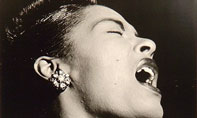- About Us
- Columns
- Letters
- Cartoons
- The Udder Limits
- Archives
- Ezy Reading Archive
- 2024 Cud Archives
- 2023 Cud Archives
- 2022 Cud Archives
- 2021 Cud Archives
- 2020 Cud Archives
- 2015-2019
- 2010-2014
- 2004-2009
 |
American Black History Month: |
Billie Holiday's haunting, disturbing song 'Strange Fruit', based on the poem by Lewis Allen, was first recorded by Holiday in 1939 after a trip she'd taken into the American South that shattered all illusions of the 'romantic South' expounded by so many since the antebellum years.

A commentary on racism and lynching in the deep South, it was to become perhaps her most famous and influential work, and the sad lament made her a star in North among white and black audiences alike.
Lynching first emerged in the eighteenth century in the Revolutionary War, however it was not until after the American Civil War that it became more specifically directed towards the African-Americans of the South. As a means of maintaining Southern white superiority over those whom they saw as being inferior to themselves, lynching was extremely effective as a means of extra-legal social control up until the first anti'lynching laws of the 1960's.
But Holiday's song is not aimed at such historical background. Her emphasis was to bring into focus the horror and stark reality of the crime of lynching:
Southern trees bear strange fruit,
Blood on leaves and blood at root,
Black bodies swinging in the Southern breeze,
Strange fruit hangin' from the poplar trees.
Though lynch mobs were generally spearheaded by a mere handful of conspirators, they could be joined in some instances by crowds numbering well into the thousands. Brutalising at times dismembering their victims, this callous activity was all carried on in the name of preserving the purity and honour of the South from what they saw as oversexe
 d black savages, and interventionist Northerners.
d black savages, and interventionist Northerners.
And indeed sex was a central principle around which much of the racial segregation and hatred of the period was organised, as many Southerners encouraged the myth of the oversexed and brutal black savage. Such a myth was a great source of fear amongst many isolated, uneducated Southern communities, and lynchings were often accompanied by the almost ritualistic castration of the black victim as a means of eliminating his source of power and the 'threat' that he posed to the community.
Those Southern whites who were brought up on the ideology of lynching and the myth of the oversexed black savage believed that their method and actions were wholly justified. Increasing opposition to lynching and racism began most significantly from the post World War Two period, however, and it brought such activities and beliefs into question, under close scrutiny and opposition.
Holidays' song closes with two verses that dramatically describe both the agony and the lack of reason that was associated with lynching:
Pastoral scene of the gallant South,
The bulging eyes and the twisted mouths,
Scent of magnolia, sweet and fresh,
Then the sudden smell of burning flesh.
Here is a fruit for the crows to pluck,
For the rain to gather, for the wind to suck,
For the sun to rot, for the trees to drop,
Here is a strange and bitter crop.
Holiday's idealised Southern landscape with its 'scent of magnolia' and gallantry served in stark contrast to the almost medieval brutalities of lynching which were so prevalent in such famous cases as the lynching of Claude Neal in 1934, Emmett Till in 1955, and Charles Mack Parker in 1959. The song highlighted the contradiction that was so often

raised by opposition groups like the NAACP and the Association of Southern Women for the Prevention of Lynching (1930), namely that there was no ...chivalry... or nobility related to the arbitrary, callous and brutal activities of many white lynchers. That is, their actions could not support their reason.
There is little doubt that the cultural memory of African-Americans today is still to some extent pre'occupied with the images that Holiday's song sparked in the minds of her listeners. Perhaps as all Americans embark upon national Black History Month this February, they might acquaint themselves with this most brilliant of songs, and learn a little of that cultural memory for themselves.
